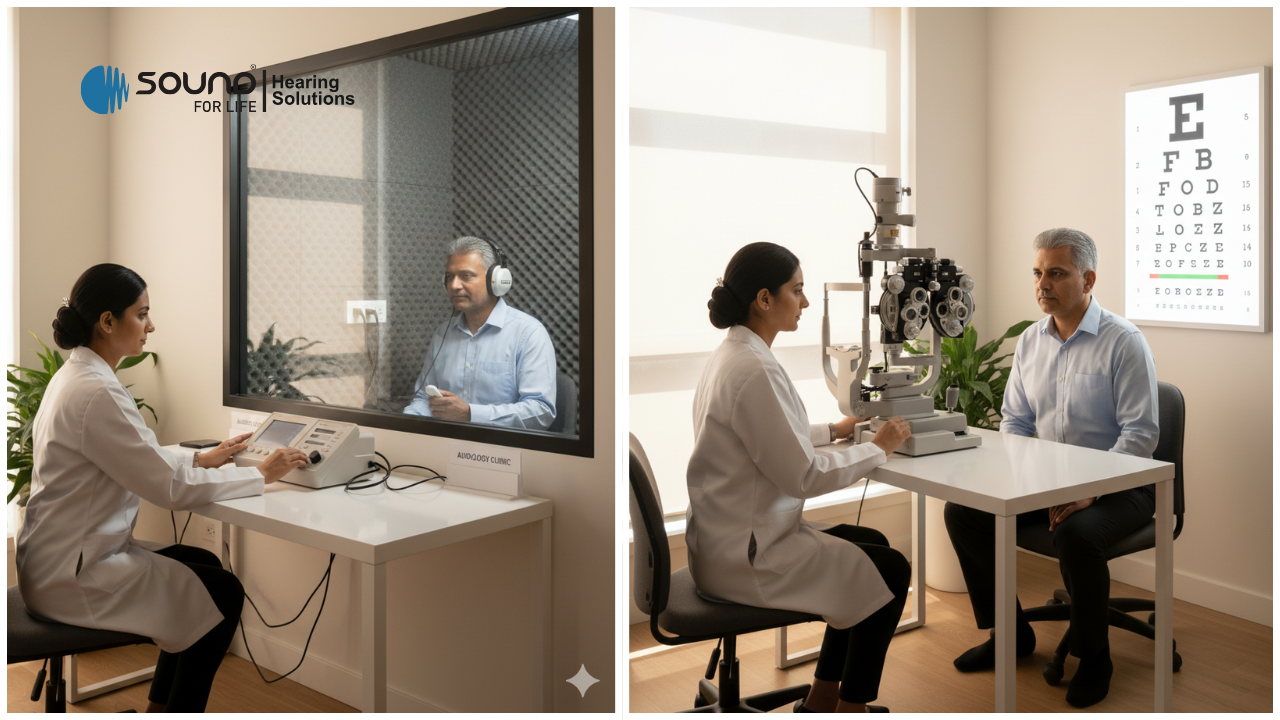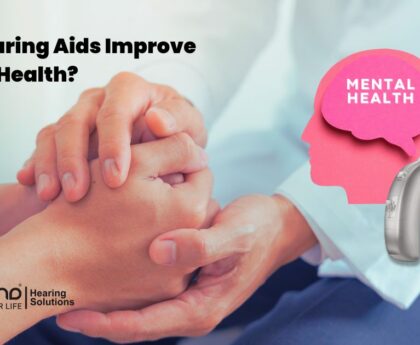Many of us put regular eye checked ups at the top of our list of health priorities rather than hearing issues. We know that monitoring our vision is crucial to detect conditions like cataracts, glaucoma, or age-related vision loss. But one important sense that people frequently forget or ignore about is our sense of hearing. Our ears need care just like our eyes do. Hearing loss is gradual and can sneak up silently, affecting communication, relationships, and overall quality of life.
At SFL Hearing Solutions, we believe that taking care of your hearing health is as much as important as taking care of your eyesight.
In this blog, we will talk about why it is just as important to get your hearing checked regularly as it is to get your eyes checked. We will also discuss what indicators to look for and how you can safeguard your hearing.
Let us understand the Importance of Hearing
One of our most important senses is hearing. Hearing well is very important, it helps us to:
- Communicate effectively with family, friends, and colleagues.
- Pay attention to alarms, traffic lights, or warning noises to be safe.
- Music, talking to others, and nature’s noises may help you enjoy life to the fullest.
If you ignore hearing difficulties, you might end up feeling alone, angry, or even mentally ill, with conditions like anxiety or depression. Sadly, hearing loss usually happens slowly, so it might be hard to detect until it really affects your everyday life.
Hearing Loss: What Causes It?
There are many reasons why people lose their hearing, and figuring out what caused it is important for therapy. Some common reasons are:
- Hearing loss that comes with age (Presbycusis): Hearing loss that happens naturally as you become older.
- Loud noises can hurt the fragile tissues of the inner ear: Fireworks, concerts, traffic, and equipment are all examples.
- Ear infections: If not treated, long-term infections can permanently damage hearing.
- Ototoxic medications: Some drugs can damage hearing over time.
- Genetics: Some people are more likely to lose their hearing.
- Daily Activities: Smoking, eating poorly, and not controlling your diabetes can all make your hearing worse.
Signs You Might Need a Hearing Check-Up
Hearing loss doesn’t become worse as quickly as visual impairments do. Keep an eye out for these signs:
- It’s hard to follow talks in loud venues.
- A lot of the time, folks have to repeat themselves.
- Making the TV or music louder than what other people like.
- Sounds like ringing, buzzing, or hissing in the ears (tinnitus).
- Not going to social events since it’s hard to hear.
It’s time to make an appointment for a hearing check-up if you detect any of these signs.
Why Hearing Check-Ups Are as Vital as Eye Check-Ups
You should make hearing tests a regular part of your health practice for these reasons:
1. Finding problems early stops them from getting worse.
If you catch hearing problems early, many of them may be treated or managed. Audiologists can find little alterations before they become big problems by doing regular check-ups.
2. Improves the quality of life
Hearing loss can affect relationships, work performance, and emotional well-being
Regular checkups help keep lines of communication open, encourage people to get involved in social activities, and boost their confidence.
3. Protects Against Cognitive Decline
When hearing loss goes untreated, people are more likely to develop cognitive decline including memory problems, and a higher risk of dementia. This process can be slowed down by early intervention.
4. Safety First
Hearing helps you keep aware of what’s going on around you. Finding out about hearing loss early on keeps you safe in your daily life.
5. Hearing Solutions Made Just for You
Audiologists can provide you personalised advice about hearing aids, lifestyle changes, or ways to avoid hearing loss if you have regular checkups.
How Often Should You Have Your Hearing Checked?
Adults should preferably get a baseline hearing test in their 40s, although the following basic rules can help:
- Kids: Regular checkups when kids start school and every so often as they grow up.
- Adults under 50: Every 3 to 5 years if there are no symptoms.
- Adults over 50: Every 1 to 2 years, as hearing loss that accompanies age becomes more likely.
- People exposed to loud noise: People who are around loud sounds should have their hearing checked once a year.
What happens when you go to a hearing check-up?
A normal hearing test is easy, painless, and doesn’t require any surgery. It generally has:
- To review your medical history: Understanding about your lifestyle, how much noise you are exposed to, and any past ear issues.
- Physical ear examination: Checking for wax buildup, infections, or structural problems during a physical ear check.
- Pure-tone audiometry: Testing how sensitive your hearing is by listening to different tones and loudness.
- Speech audiometry: Testing how well someone can interpret speech in both quiet and loud places.
- Tinnitus assessment: If ringing or buzzing sound is present in the ears.
- Suggestions and follow-up: Personalised guidance, hearing aids if required, and preventive measures.
Simple Ways to Keep Your Hearing Safe
Along with regular check-ups, some preventive steps can be taken:
- Limit how long you stay near loud noise. If you are at a concert or working in a noisy place, wear earplugs or earmuffs.
- Keep headphone volume at a moderate level and take regular breaks, a helpful rule is no more than 60% volume for up to 60 minutes at a time.
- Avoid close, prolonged exposure to firecrackers and loud fireworks, especially during festivals; step back, use hearing protection, or move indoors if you can.
- Move away from noisy sources whenever possible and consider using noise-cancelling headphones so you don’t feel the need to raise the volume.
- Get your hearing checked regularly and seek help early if you notice ringing, muffled sounds, or difficulty following conversations.
- Keep your ears clean and dry. Use a soft cloth to clean them, and don’t put cotton swabs deep within the ear canal.
- A good diet and regular exercise help blood flow to the inner ear.
- Keep diabetes, high blood pressure, and cholesterol under control if you have a long-term illness.
Hearing Aids and Other Helpful Tools
If you have hearing loss, new hearing aids and other equipment may make your life a lot better:
- Digital hearing aids: Automatically change to fit different places.
- Bluetooth-enabled devices: Devices using Bluetooth can connect to phones and TVs.
- Invisible or behind-the-ear options: Easy to wear and not too noticeable.
- Assistive listening devices: useful in theatres, meetings, and classes.
Keep in mind that getting hearing aids early will help you in the long run.
Hearing Health vs. Eye Health: Key Comparisons
| Aspect | Eye Health | Hearing Health |
| Common age-related changes | Presbyopia, cataracts | Presbycusis (age-related hearing loss) |
| Regular check-up frequency | Every 1-2 years | Every 1-2 years after 50, or sooner if symptoms appear |
| Early detection benefit | Prevents vision deterioration | Prevents cognitive decline, social isolation, and communication difficulties |
| Preventive measures | Eye exercises, glasses, UV protection | Noise protection, ear hygiene, hearing aids |
This comparison clearly shows that hearing deserves the same attention as vision.
Hearing Loss Myths
Myth 1: Hearing loss only happens to older individuals
Fact: Hearing loss can happen at any age because of loud exposure, infections, or heredity.
Myth 2: Hearing aids are reserved for those who have lost a lot of hearing.
Fact: Even a little amount of hearing loss can become better with hearing aids.
Myth 3: My hearing are healthy if I can hear
Fact: Many people don’t realise when their hearing starts to disappear. Small adjustments need to be tested by a specialist.
When to See a Hearing Specialist
If you see any of the following, get professional help:
- Ringing or buzzing in the ears that doesn’t go away.
- Sudden loss of hearing in one or both ears.
- It is hard to comprehend speech when there is a lot of noise.
- Earaches, discharge, or infections that keep coming back.
At SFL Hearing Solutions, our audiologists do thorough evaluations and come up with personalised solutions for people of all ages.
The Bottom Line
Hearing tests are equally as important as vision tests. They avoid long-term issues, boost social and emotional well-being, and assist preserve general health. If you don’t take care of your hearing, you might become isolated, less productive, and lose your cognitive abilities.
You may stay connected to the world of sound, clear, safe, and pleasurable by making hearing tests a regular part of your health care.
Take Action Today
Don’t wait until your hearing loss makes it hard to live your life. Make an appointment with SFL Hearing Solutions now to have your hearing checked. This is the first step in safeguarding your hearing. Finding out about it early can make all the difference.
Your ears need the same care as your eyes, so make hearing health a top priority now!
Disclaimer: This blog is simply meant to give information and should not be used as medical advice. Always see a certified audiologist or other medical practitioner to find out what’s wrong with your hearing and how to fix it.





